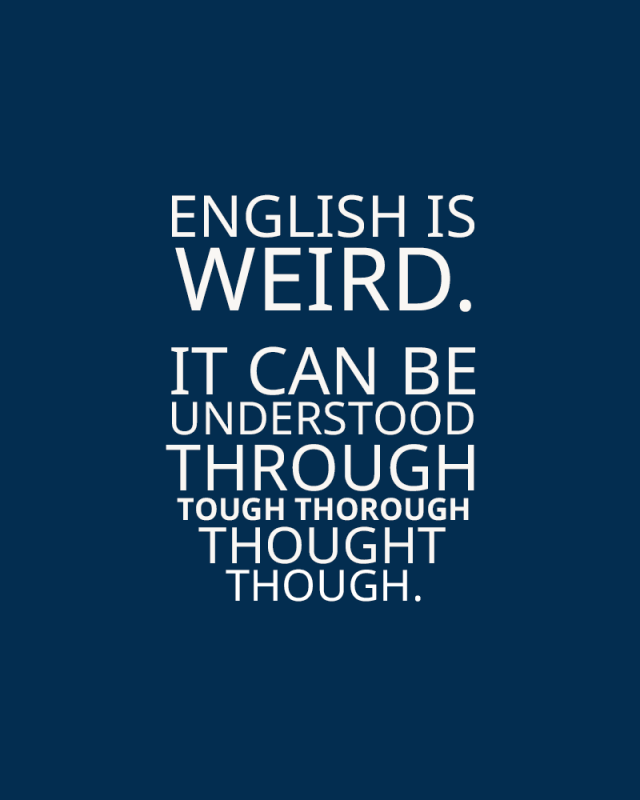English is a lovely language. I wouldn’t say it’s the most complex language but trust me if I hadn’t been raised with it, it would have been a hell of a task to learn it.
It’s a language where you can use the word had in a sentence 9 times in a row, and it would still make sense.
For example, the teacher gave James and John a test which asked them to decide whether to use “had” or “had had” in a sentence. When the teacher collected the sheets she found that, James, while John had had “had“, had had “had had“; “had had” had had a better effect on the teacher.
It took me a while (2 years actually) but I finally got it. Do you?
Let’s talk more about this wonderfully weird language.
First up, I’d like to address how LAZY the people who came up with language are!. They gave the same word, different meanings, sometimes OPPOSITE meanings that we are somehow supposed to decipher with the “tone” of the sentence. Say WHAT?
- Homophones – words having the same pronunciation but different meanings or spellings.
For example – new and knew, bear and bare, pole and poll
- Heteronym – words that are spelled the same but have different meaning and are also pronounced differently.
For example – tear (in the eye) and tear (rip), bow (to bend at the waist) and bow (ties with a ribbon)
- Homographs – words that are spelled the same and pronounced the same but have different meanings.
For example – kind (caring) and kind (type), mean (average) and mean (cruel), bark (of a tree) and bark (a sound that a dog makes)
- Contronym – a single word having opposite meanings.
For example – peruse (to read without attention to detail/to read in detail), screen (to conceal/to broadcast), left (remained behind/departed)
Read More: British English Vs. American English: What’s The Difference?

Next up, words in the English language with weirdly specific meanings.
Go ahead. Use them in your everyday conversation and make an impression! (Or risk losing the few friends you have)
-
Nudiustertian (adj.): pertaining to the day before yesterday
Ah YES. FINALLY a pretentious word I can use to pretend to care about what people did over their weekend.
-
Qualtagh (n.): the first person one encounters after leaving one’s home
Did you mean, a मनहूस?
-
Tarantism (n.): an illness characterized by the sudden urge to dance
Now I understand the plot of Footloose!
-
Aglet (n.): the plastic coating at the end of a shoelace
All praise Phineas and Ferb for this sweet piece of info!
-
Floccinaucinihilipilification (n.): the act of estimating something to be worthless
Seems like an awful lot of time spent over something that is seemingly worthless.
-
Defenestration (n.): action of throwing someone out of a window
Why?
-
Rhoticism (n.): excessive use of the letter R
Rather recklessly rambunctious, no?
-
Cornobble (v.): to slap or beat another person with a fish
Maybe engage in the act just so you can use the word?
The next piece of information was an exciting discovery for me.
So I’m sure a lot of you know what a palindrome means. It’s basically a word or a phrase that reads the same forwards and backward. Like, madam or Malayalam.
So I was little disappointed that the word “palindrome” is not a palindrome itself.
BUT, EMORDNILAP (which is palindrome spelled backward) are words that produce other words when spelled backward.
Like, stressed and desserts, drawer and reward, time and emit.
So basically,
“emordnilap palindrome” IS AN EMORDNILAP PALINDROME
ENGLISH IS SO COOL, YOU GUYS!
Also, did you know there is a specific order to place adjectives in a sentence? I don’t think we were taught a specific order in school but it has been ingrained into us so deeply that if instead of writing,
“I saw two beautiful little girls yesterday”
I write,
“I saw little beautiful two girls yesterday”
I literally cringe. And I’m pretty sure you did too.
So, the order goes –
- Number (ten)
- Opinion (lovely)
- Size (tiny)
- Age (old)
- Shape (spherical)
- Colour (white)
- Origin (Asian)
- Material (marbles)
- Purpose (for playing)
The more you know!
Did you know some of the most common words we use today were invented by Shakespeare? Words like luggage, elbow and, eyeball! If you have ever wondered why his plays always come with a glossary at the bottom of each page, now you know why!
Other words invented by the brilliant man include –
- Deafening
- Exposure
- Unreal
- Outbreak
- Varied
- Gossip
- Birthplace
- Bet
- Secure
- Bloodstained
- Lonely
- Hint
- Fixture
In conclusion, English is cool but it’s hella weird which is why I’m glad to have been brought up in an English-medium school, because Lord help me if I had to learn it later in my life.
And now, I’m going to leave you with this fantastic lil pun.
If womb is pronounced “woom” and tomb is pronounced “toom”, then shouldn’t bomb be pronounced “boom”?
Cheers!
Image Credits: Google Images
Disclaimer: We do not hold any right, copyright over any of the images used, these have been taken from Google. In case of credits or removal, the owner may kindly mail us.
Other Recommendations:
I Speak 4 Languages: English, Hindi, Swearing, Sarcasm. Some Speak 20






























